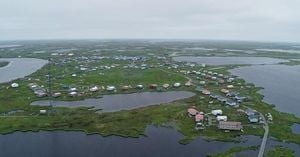Rumors swirl around the Nord Stream pipeline explosion as accusations and denials fill the air. On September 26, 2022, the pipelines, which carried Russian gas to Europe, registered significant leaks along the Baltic Sea's floor.
Seismologists confirmed the presence of explosions, triggering widespread speculation about the motives and parties involved. Russia quickly claimed the attacks were coordinated acts of sabotage by the United States and Britain, allegations the two nations vehemently denied.
Ukraine has been drawn directly to the center of this contentious debate, with its officials denying any involvement. Ukrainian presidential adviser Mykhailo Podolyak stated, "Ukraine has nothing to do with the Nord Stream explosions," challenging claims made by Russian authorities.
German officials have also entered the fray, recently issuing arrest warrants for individuals believed to have played key roles in the sabotage. Notably, one Ukrainian diver is accused of working with others to place explosives on the pipelines.
This development came shortly after reports emerged, alleging Ukraine's top military commander, Valery Zaluzhny, had approved plans relating to the explosions. This has resulted in more questions than answers, as many are unclear about the chain of command and decision-making process within Ukraine's military and political leadership.
Germany's investigation is continuing as it looks for additional suspects and methods employed during the sabotage. Reports suggest there were six people involved who used rented boats to carry divers to the site where the explosives were strategically placed.
According to sources, the plan may have been discussed among Ukrainian military officers and businessmen shortly after Russia launched its full-scale invasion. While some have pointed fingers at military operatives, the situation remains shrouded with uncertainty.
The backdrop of these events plays heavily on the geopolitical stage, particularly between Russia and the West. This incident not only escalated tensions but also amplified accusations concerning espionage and foul play, complicing relations even more.
Interestingly, Ukrainian President Volodymyr Zelensky hinted the operation would not have taken place without substantial resources and backing. He reportedly called off the plan when prompted by U.S. Intelligence, but it was too late as operations were already underway.
Nonetheless, skepticism about these allegations runs deep, particularly with the Ukrainian public and its government officials expressing outrage and disbelief at the accusations. They argue it's merely part of Russia's larger strategy to deflect blame and create discord among allies.
German authorities remain vigilant, leaning toward the belief foreign involvement likely played a role behind the scenes of the explosions. They’re conducting interviews and working with international partners for greater insights.
Despite the array of accusations and finger-pointing, the solid evidence for each claim remains elusive. Analysts warn against jumping to conclusions without concrete proof, as the stakes surrounding energy security are incredibly high for Europe, especially amid the conflict between Russia and Ukraine.
U.S. officials have consistently maintained they had no role in sabotaging the pipelines. Following early rumors, officials emphasized diplomacy and support for Ukraine were their key focuses and goals.
Many experts urge caution and suggest keeping dialogue open to avoid inflaming the situation. The international community remains on high alert, awaiting for more data to accurately assess the fluctuations in these complex and delicate interactions.
It's worth noting, the Nord Stream pipelines were not merely conduit systems for gas, but also symbols of greater economic ties and dependencies. Disruption like this sends shockwaves not just through energy markets but also impacts broader geopolitical sentiments.
With winter approaching, European countries remain wary of energy supply interruptions. These anxieties have led to some countries urging for diversification away from Russian gas dependencies completely.
The dialogue surrounding this explosive situation continues to evolve, shaping energy policies across the continent. Countries now must navigate these complex geopolitics carefully to fortify their energy resilience as they brace for potential crises.



